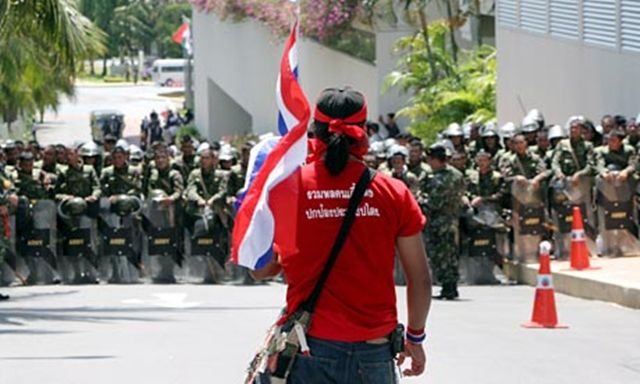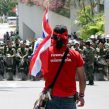
Bombings in Bangkok: A Return to Political Violence for the Red Shirts?
Publication: Terrorism Monitor Volume: 8 Issue: 31
By:

After barely two months of calm in the Thai capital following a bloody end to the April-May protests, a pair of explosions in Bangkok threaten to mark a new wave of political violence in the confrontation between the “Red Shirts” (supporters of the United Front for Democracy Against Dictatorship-UDD) and the “Yellow Shirts” (supporters of the People’s Alliance for Democracy-PAD) (see Terrorism Monitor, May 28). The Red Shirts support the return of exiled Prime Minister Thaski Shinawatra, who has reportedly spent a good amount of time in the United Arab Emirates since his 2006 ouster in a bloodless military coup (AFP, November 16, 2008).
A by-election marked Thailand’s first political test since May 19, when the Royal Thai Army put a forcible end to protests which left 89 dead and some 1,900 wounded (Bangkok Post, June 19). Due to the death of a parliamentarian in June, a by-election was held on July 25 in Bangkok’s suburban 6th district that pitted a leading UDD politician, Korkaew Pikulthong (currently jailed on terrorism charges), against PAD candidate Panich Vikitsreth. The Thai electoral commission allowed the Red Shirt’s Pikulthong to run from behind bars, in part to prove Thailand’s democratic bona fides. No sooner were the votes beginning to be tallied for an apparent victory by Vikitsreth’s pro-army, pro-establishment Yellow Shirt faction than a terrorist attack shook downtown Bangkok. The victory of Panich Vikitsreth, an ally of Prime Minister Abhisit Vejjajiva, may have been a relief to those craving a return to stability, but may have further enraged radicals on the violent margins of the Red Shirt movement who believe they are acting in Shinawatra’s name, despite his pleas for calm and non-violence. After his candidate’s defeat, Shinawatra said to his passionate followers via his Twitter account, “People who love me and wish me well need to persevere against injustice and cruelty. Please don’t solve the problem through violence because I don’t like it and disagree with it” (Pattaya Daily News, July 26). [1]
The explosive device was an American-designed M-67 fragmentation grenade rigged with an alarm clock to delay detonation until a preset time. The explosive detonated during the evening rush hour at a bus stop on congested Ratchadamri Street. The stop was located in front of the burned out hulk of a Big C department store in Bangkok’s upscale Ratchaprasong shopping district, much of which was destroyed in the Red Shirt violence this spring. The grenade, containing Composition B explosive (a mixture of RDX and TNT), killed one and injured 10, including a Burmese national. Police General Panupong Singhara Na Ayutthaya stated that the electrical circuitry used in the attack indicated that the bomber was likely an explosives expert who was either politically motivated or was “intent on creating a ‘situation’ in the nation” (Pattaya Daily News, July 26). A Red Shirt spokesman, Prompong Nopparit, stated that the Ratchadamri attack was carried out by proponents of PM Vejjajiva’s Yellow Shirt agenda. “I believe the bomb came from a group who support the government and want emergency rule to be continued," Nopparit said (Bangkok Post, July 26).
The M-67 grenade is stocked by the Royal Thai Army. In early March, a robbery occurred at a barracks in southern Thailand’s Phatthalung Province that resulted in the loss of 69 M-67s. The culprits, a group of army privates, slipped up and a portion of the arms cache was later recovered. Though it is not publicly known precisely how many M-67s were recovered and how many were returned, it is believed that some of the grenade stock is still loose in the country (Khao Sot [Bangkok], July 30). Several weeks after the southern depot theft, an M-67 was hurled at the house of another former prime minister, Banharn Silpa-archa, shortly before the April-May troubles erupted (Reuters, May 14; The Nation [Bangkok], March 30).
While the Thai capital was still on edge after the July 25 attack, a second grenade exploded on July 30, when an unfortunate rubbish scavenger happened upon it hidden in a trash pile (Mass Communications Organization of Thailand, July 30; Bangkok Post, July 30). The second grenade had the pin removed prior to its placement with the safety lever held in place by a rubber band. It exploded when it was accidentally jostled by the man, who suffered cranial shrapnel wounds, as he picked through rubbish bags across from the well-known King Power duty-free shopping center on Bangkok’s Rangnam Road. It was very likely meant to explode amidst a crowd later in the day to instill more fear after Sunday’s bombing. On July 31 three more grenades were discovered in a drainage ditch outside the Government House in Bangkok (Thai News Agency, July 31).
No one has claimed responsibility for these incidents, nor has the Thai security apparatus yet affixed blame. Though the Thai military immediately stated that the July 25 incident was not related to the by-election, many Bangkokians have their doubts (Bernama [Kuala Lumpur], July 26). The central government has been gradually lifting the emergency rule orders, though the decree still remains in effect in ten provinces, including Bangkok. PM Vejjajiva indicated that the normal rule of law will eventually be restored, with Bangkok being the last district to eventually return to normalcy upon the completion of the investigation into the spring uprising by the Centre for the Resolution of the Emergency Situation (Bangkok Post, July 30). For the moment, Thailand’s political narrative is in deadlock, with billionaire media mogul Thaksin Shinawatra positioned as a hero to Thailand’s poor and sitting PM Abhisit Vejjajiva positioned as part of the pro-royalist elite only interested in furthering his own gains at the cost of genuine democracy. The government suggests, without being entirely direct in its approach, that non-state actors backed by political power brokers are using urban terrorism to make it appear weak. The opposition claims the elites in power, the Yellow Shirts, are actually using the explosions to prolong the state of emergency in Bangkok and consolidate rule, which the Red Shirts believe to be unconstitutional. Thailand’s Deputy Prime Minister, Suthep Thaugsuban, told the press, “It is regrettable that the bomber wanted to incite further unrest to show that the government cannot control the situation” (AFP, July 30). Red Shirt spokesman Nopparit denounced the July 25 bombing, saying that it “gives the government a reason to extend the ongoing emergency decree” (Pattaya Daily News, July 27).
Note
1. For the original Thai, see Thaksin Shinawatra’s Twitter account, www.twitter.com/Thaksinlive





